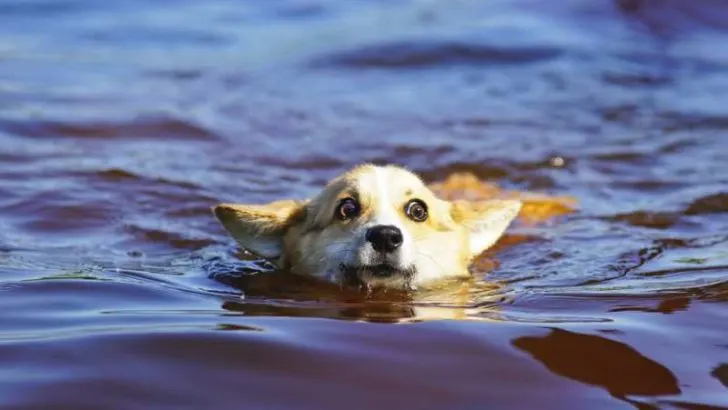Our dogs are multi-talented creatures who never fail to amaze us with their intelligence and capabilities. Knowing this, we want to give them as many opportunities to express their abilities whilst enjoying themselves to the maximum.
So, the hot summer days have come upon us, and the thought sprung up on you – “Are Corgis good swimmers?”. Because if they are, then that opens up a whole new world of possibilities for adventures with your pup.
The answer here – Corgis aren’t water dogs, meaning they aren’t innately talented swimmers nor were they built for swimming.
However, that doesn’t mean that Corgis can’t swim, nor that they won’t enjoy it. With all this in mind, there are a few things you should know before letting your doggo jump into some refreshing water. If you want to know more, just keep reading!
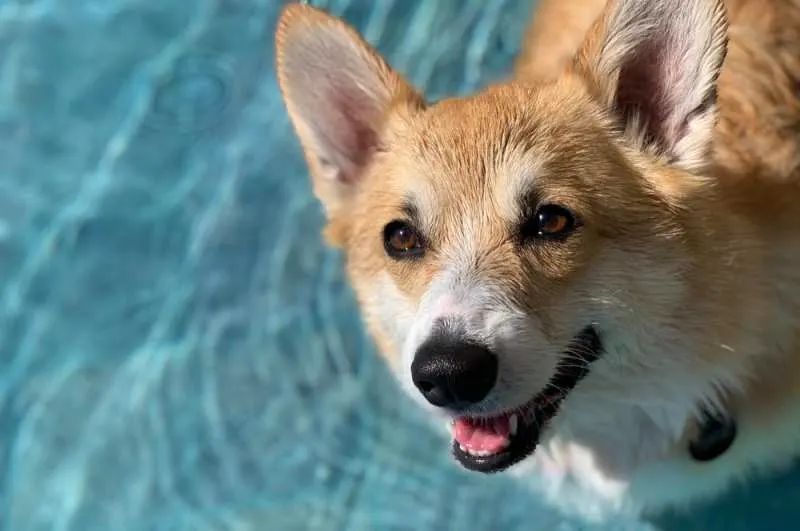
Dogs And Swimming
There are many different dog breeds out there and each of them has their own set of characteristics that is more prominent within that breed than in others.
There are also groups of dog breeds that are bred to be “specialized” in certain areas – hunting dogs, herding dogs, guard dogs and so on.
Some of these breeds, such as Labrador Retrievers, Poodles, Border Collies, English Setters, Lagotto Romagnolos, etc. are exceptional swimmers.
The reason they are exceptional swimmers is because the jobs they were bred for doing include working in the water, to some capacity. Whether it’s retrieving prey, hunting, rescuing, these dogs were built to be in water.
Their bodies check off all of the requirements of a good swimmer, and they can usually get accustomed to these situations pretty easily.
There are also instances of dogs of certain breeds that weren’t necessarily born swimmers, but because they were introduced to water and swimming when they were just tiny little puppers properly, have learned to love it and have fun in the water.
On the other hand, we have some breeds that were built in the complete opposite way. These dogs aren’t natural swimmers and they probably wouldn’t enjoy time spent submerged into any body of water.
Breeds such as Bulldogs, Boxers, Bull Terriers, Pugs, Basset Hounds, Dachshunds and Corgis weren’t built for swimming. Most of these breeds have one thing in common – their body shape.
They have a barrel-shaped body and short legs. Some of them, to add to that, have a flat face, bringing on more difficulties in completing the seemingly easy task of swimming.
For these breeds, swimming might be seen as a punishment rather than a fun day at the beach.
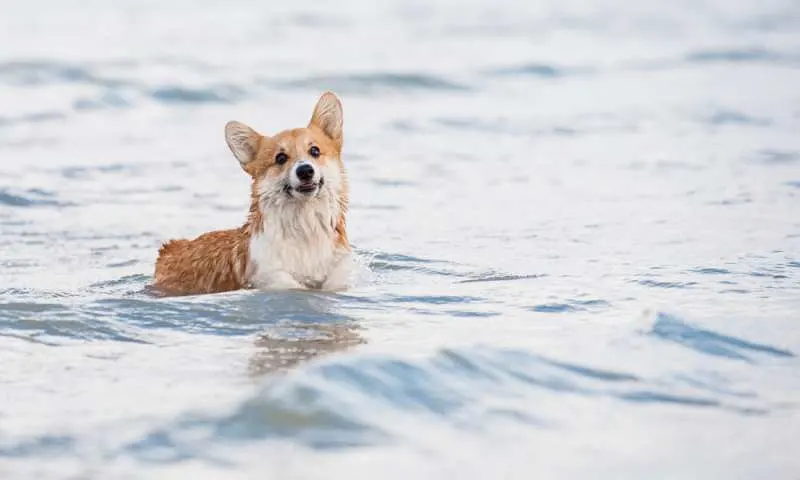
Corgis As Swimmers
As you’ve probably noticed, Corgis were on the list of the not-so-talented swimmers. The reasons for this are pretty obvious. Hint: it’s the legs.
The way these dogs were built makes it difficult for them to navigate their way through water and hold their weight there properly.
However, what might surprise you is that Corgis possess some characteristics that might put them at an advantage in comparison to the other short-legged breeds. This is thanks to their breeding background.
Corgis are herding dogs. They herd cattle and other livestock, so it is necessary for them to have strong and powerful legs. They’re also very athletic, so there’s a high chance they will enjoy almost any kind of physical activity offered to them.
All of these are reasons why you should give your Corgi a chance to try swimming and decide for themselves how they like it. There’s a high chance your pup might turn out to be an excellent swimmer!
Keep in mind though, that even with these advantages, they still aren’t physically built for swimming, so they might need a little bit of assistance both from you and some gear that you can provide them with.
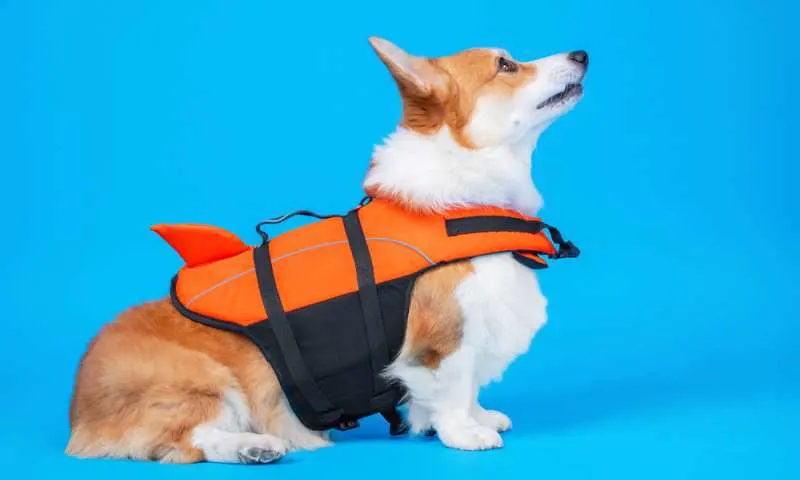
Swimming Gear
Just like when kids are learning to swim, dogs need some help in this area too. There are many benefits to supplying your dog with some swimming equipment, regardless of its breed, size or swimming prowess.
So, here are a few of the most important pieces you should get your Corgi to assist them in their swimming beginnings:
Life Jacket
The most important thing about your dog’s time in the water is for them to be safe. There are many factors that affect this, some foreseeable, some not. Regardless, you should always take precaution before letting your dog dip their paws in the water.
Many reasons point to the need for dog life jackets when you are taking your dog for a swim. Whether it’s because they’re not great swimmers, because they get tired quickly, they’re new to swimming, wanting to forestall any unpredictable hazards, or whatever else you might think of, life jackets are your dog’s best friend.
Luckily, there are many kinds of life jackets, tailored to fit every breed out there and keep our beloved four-legged friends safe whilst enjoying their time in the water.
So, go ahead and do some research before taking your dog for a swim, and get them a fancy life jacket and you’ll have one less thing to worry about.
Floating Dog Toys
Getting your pup to even step into the water (especially if it’s their first time doing so) can sometimes be a task in itself. If this is the case, you’ll need some help.
Dogs love to play and they love their toys. So, whenever you can make a semi-uncomfortable situation seem like play, you’re winning.
There are many dog toys made to be played with in the water, so open up Google and search for the ones you think your doggo will enjoy!
Paddle Boards
This one might seem unexpected, but it’s actually a great helper in your dog’s fist swimming endeavours.
Water is a new environment for your Corgi, so having something solid to lean on or stand on is very helpful in making them feel safer.
These are especially great for smaller dogs, because you can get in the water with them standing on the board so that they feel safer when they are just starting to get used to being in water.
There aren’t specific swimming paddle boards for dogs, but you can get ones made for kids.
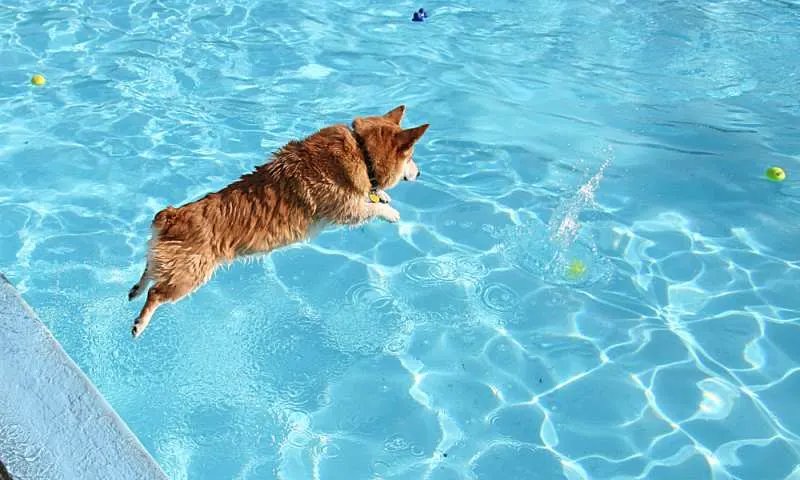
Your Role
You know what equipment might be of help while getting your dog used to water, but what’s more important is how you approach this situation.
Some dogs might not even need a nudge when they find themselves in front of water, they just jump in like they were born there.
On the other hand, there are dogs that might find this experience intimidating and stressful, so your support is key.
Be Calm
First and foremost, you have to be calm. Dogs sense our energy and emotions, and reflect them. So, an already nervous dog can only get more nervous if that’s how you’re feeling too.
If you are happy, relaxed and encouraging, they’ll probably quickly follow suit. You need to show that you are in control of the situation and that it’s fun rather than dangerous or scary.
This might not be the easiest task, as it can also be nerve racking for owners to take their dogs swimming for the first time, because they do not know what to expect. It’s completely normal to feel this way, but if you’ve taken all the necessary precautions, there will be fewer reasons to worry.
Shallow Water First
Before your Corgi can swim, they’ll need to get used to the idea of being in water first.
To make this easier, take them to some shallow body of water or a pet friendly pool – you’ll have more control there and the risks are significantly lower.
If your dog has decided that they do not like swimming and that it’s not their activity of choice, shallow water is a great option to still have some fun and cool off without doing what they don’t like.
Take It Slow
Just because your pup might not be showing signs of enjoying water at first, doesn’t mean it won’t grow on them. Once the initial fear of the unknown wears off, they might realize that there is so much to enjoy.
However, don’t rush them in this. Let them set the pace. Even if the first couple of swims only last a couple of minutes, they can be very constructive.
It’s crucial that your dog doesn’t get traumatized by something during their initial swimming experiences, because then it might be difficult to work them through it and get them to enjoy swimming in the future.
Follow their pace, watch out for any signs of discomfort and always show them that they are safe.
You know what they say – slow and steady wins the race.
Don’t Push Them
If you’ve given your dog enough room to decide whether they like swimming or not, and they have settled on it not being something they enjoy, don’t force it on them.
We all have some activities we enjoy more than others and it’s better to allow your dog to enjoy those than insist on them doing something they don’t like or are not good at.
Since Corgis weren’t necessarily built for swimming, it might just be physically impractical for them and that’s the reason they want to stay away.
If you still want your furry friend to accompany you at the beach or the pool though, know that they can still have a great time prancing around and soaking in the sun, without getting in the water.
You can pour some water on them to help them cool off and always make sure there’s enough water available for them to drink (sea/ocean/pool water doesn’t count!).

Summary
You came to this article wondering “Are Corgis good swimmers”, and probably for a good reason. There is so much fun you can have in the water with your doggo, plus there’s nothing cuter than their paddling legs moving through the water.
Hopefully, your question has been answered and you now have all the necessary information to introduce your Corgi to swimming and to make sure they love it.
Here is a brief rundown of all the useful information that we’ve gone over in this article:
Corgis aren’t natural swimmers, and they weren’t blessed with a swimmer’s physique. However, that doesn’t mean that they can’t enjoy it and that they can’t be good at it.
Their herding background gives them an advantage over their fellow short-legged, barrow-bodied friends, so why not give it a go.
However, precisely because of their build, you might need some gear to make this experience safer and more enjoyable. Your best friends here are a life jacket, floating dog toys and paddle boards.
Even more important is how you act and feel on these occasions. You need to be calm, self-assured and reassuring to them. Your dog will most likely mirror your energy and even if they are nervous at first, it will likely wear off if you exude positive energy.
Listening to your dog and taking things at their own pace is another key to them loving water. Don’t rush them and keep in mind that even short swimming sessions are a good start.
Lastly, if your dog has, after enough experiences with water, decided that it’s simply not for them, leave it. There are many activities that you and your dog can enjoy together, so there’s no need to push them into something they don’t enjoy.
So, now that you are equipped with the right knowledge, set off on an exciting water adventure with your Corgi, be safe and don’t forget to have fun!

